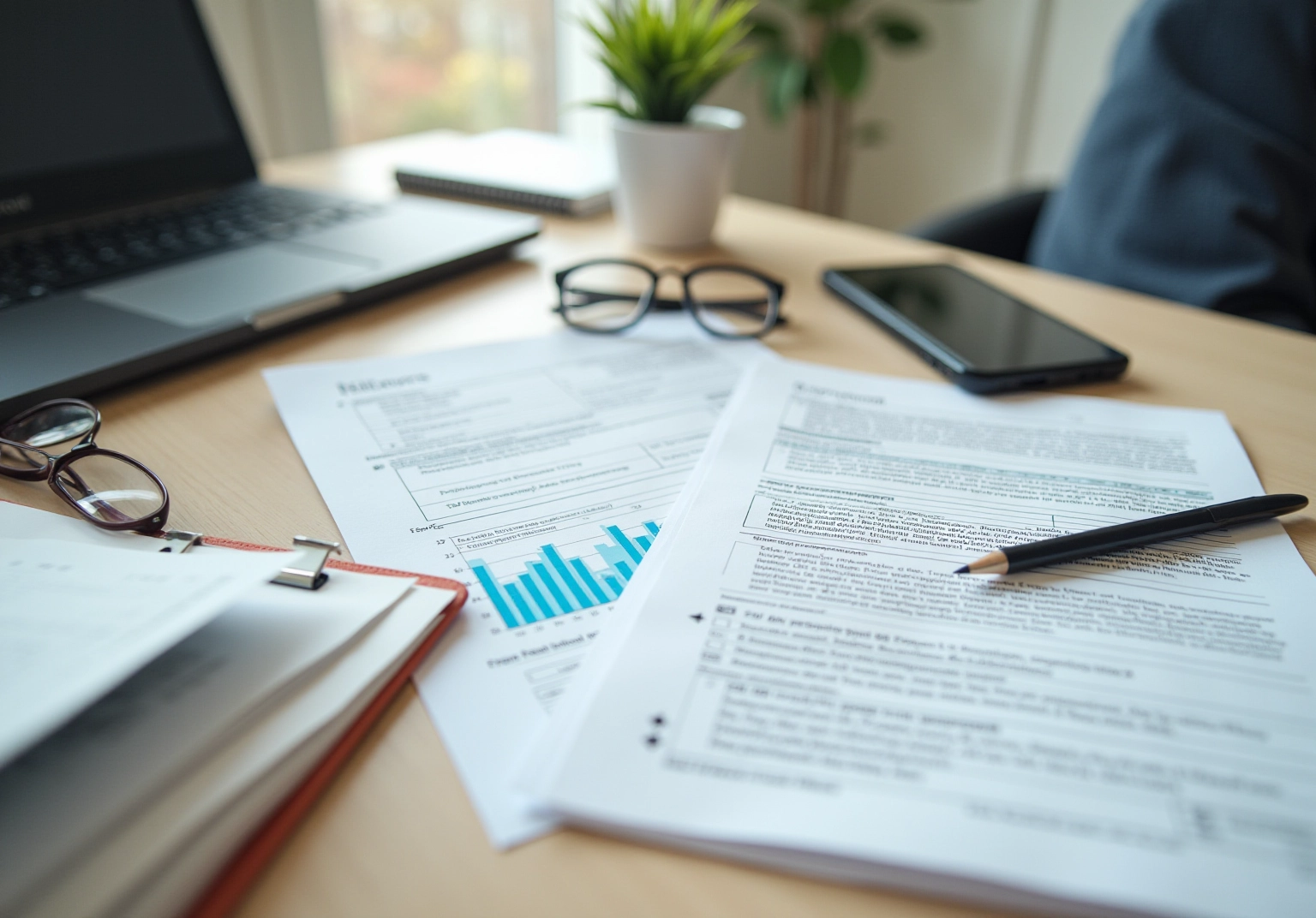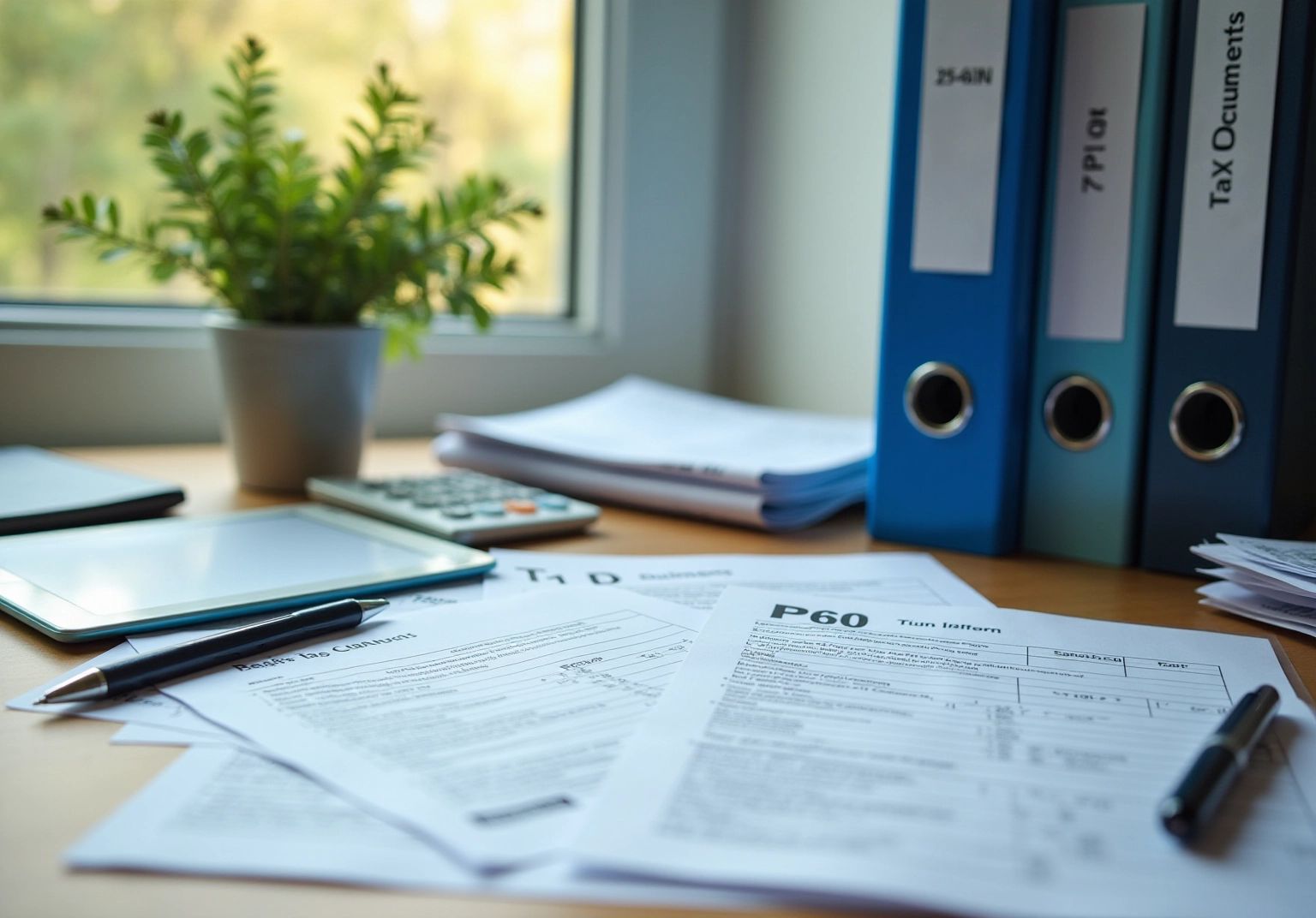Overview
Essential documents for tax preparation that should be brought to an accountant include:
- P60 and P45 forms
- Bank statements
- Dividend vouchers
- Receipts for deductible expenses
These records provide the necessary information for accurate tax returns. Organising these documents not only minimises errors and accelerates the filing process but also reduces client fees. This highlights the critical importance of preparation in the tax process.
Key Highlights:
- Essential tax documents include P60 and P45 forms, bank statements, dividend vouchers, and receipts for deductible expenses.
- The P60 form summarises annual earnings and tax deductions, while the P45 form details earnings and contributions upon job departure.
- Only 30% of individuals have all essential tax documents organised before filing, highlighting the need for better preparation.
- Organised tax records reduce submission errors and accelerate the tax preparation process, potentially lowering client fees.
- Income documentation (e.g., P60s, P45s), expense records, investment records, personal information, and other relevant forms are crucial for accurate tax returns.
- Strategies for efficient document gathering include creating a checklist, establishing a dedicated folder, leveraging technology, starting early, and maintaining updated records.
- Utilising tools like Glasscubes can save significant time and improve the document collection process during tax season.
Introduction
Understanding the intricacies of tax preparation can be daunting, particularly when it comes to gathering the necessary documents. A staggering 70% of individuals lack proper organisation before filing, underscoring the critical need for essential paperwork to be readily available for a smooth tax season. This article delves into the specific documents required for effective tax preparation, emphasising the importance of meticulous organisation and the significant benefits it offers in reducing errors and expediting the filing process. As tax deadlines loom, one must consider:
- What are the key documents that can make or break an efficient tax return?
Define Essential Tax Documents for Preparation
Vital tax papers for preparation include various forms and records that highlight what to bring to accountant for tax preparation to ensure accurate completion of tax returns. Among these, the P60 form is particularly notable as it summarises an employee’s annual earnings and tax deductions, serving as an essential reference for tax calculations. Similarly, the P45 form, issued when an employee departs from a job, details their earnings and tax contributions up to that point, making it equally significant for ensuring precise reporting.
In addition to these forms, it is important to know what to bring to accountant for tax preparation, which includes essential documents like:
- Bank statements
- Dividend vouchers
- Receipts for deductible expenses
Collectively, these records provide the critical details necessary for understanding what to bring to accountant for tax preparation, report income, claim deductions, and ensure compliance with tax regulations. Notably, a recent survey revealed that only 30% of individuals have all essential tax papers organised prior to filing, underscoring the importance of preparation in the tax process.
Experts emphasise that understanding what to bring to accountant for tax preparation and having these documents readily accessible not only streamlines the filing process but also diminishes the risk of errors and potential audits. For example, tax professionals consistently highlight the significance of the P60 and P45 forms in accurately reflecting an individual’s financial situation, which is vital for effective tax planning and compliance.
Utilising tools like Glasscubes can significantly enhance this workflow; their automated file collection feature allows accountants to provide clients with secure links to individual file request portals. Clients can easily upload required documents without the hassle of logging in, ensuring a more efficient and quicker collection process. The portals clearly display a checklist of necessary papers, along with a status indicator that updates automatically as items are received. Users have reported saving an impressive 288 hours in a single tax season, demonstrating the efficiency achieved through proper file preparation and organisation with Glasscubes.
Explain the Importance of Organizing Tax Documents
Arranging tax records is essential for a multitude of reasons, including understanding what to bring to accountant for tax preparation.
Firstly, understanding what to bring to accountant for tax preparation significantly reduces the risk of errors during submission; having all necessary documents readily accessible minimises the likelihood of omitting crucial information. In fact, firms that adopt systematic record management have reported a remarkable 50% decrease in client response times, which directly correlates with fewer filing errors. Traditional email communication often leads to challenges such as misplaced responses and laborious information gathering, complicating the tracking of outstanding requests.
Secondly, understanding what to bring to accountant for tax preparation can accelerate the tax preparation process by helping to organise records, enabling accountants to operate more efficiently and potentially lowering fees for clients. For instance, users of Glasscubes have saved an astounding 288 hours in just one tax season, illustrating how effective organisation can streamline workflows.
Ultimately, maintaining orderly tax files ensures compliance with tax regulations, providing a clear audit trail should tax authorities need to verify reported income and deductions. Overall, a systematic approach to file organisation, bolstered by features such as automated reminders that pursue late or missing items and real-time reporting that offers visibility into outstanding requests—available through Glasscubes—not only results in significant time savings but also delivers peace of mind during tax season. This is thanks to its secure and GDPR-compliant framework, allowing accountants to concentrate on delivering value to their clients.

Detail Categories of Required Tax Documents
The required tax documents can be categorised into several key groups:
-
Income Documentation: This category includes essential forms such as P60s, P45s, and 1099s, which report various types of earnings, including employment, self-employment, and investment revenue. Precise earnings reporting is vital, as the top 10% of earners contribute over 60% of total tax receipts in the UK. This statistic underscores the significance of comprehensive documentation to guarantee that all revenue sources are declared, which is essential for precise tax returns.
-
Expense Records: Receipts and invoices for deductible expenses, such as business-related costs, medical expenses, and charitable donations, are vital for maximising tax relief. Proper documentation helps avoid common mistakes, such as omitting deductions, which can lead to penalties.
-
Investment Records: Documents such as dividend vouchers and interest statements from banks are essential for reporting investment earnings. These records ensure that all income sources are declared, which is critical for accurate tax returns.
-
Personal Information: This includes identification documents, National Insurance numbers, and any relevant tax identification numbers. Submitting precise personal information is essential to prevent delays in handling tax returns, as inaccuracies can result in considerable obstacles during the filing.
-
Other Relevant Forms: Depending on individual circumstances, additional forms such as the P11D for benefits in kind or records of capital gains may be necessary. Each category plays a crucial role in ensuring a complete and accurate tax return, ultimately aiding accountants in determining what to bring to accountant for tax preparation to streamline the process.
To illustrate what to bring to accountant for tax preparation, Sophie Montgomery from TaxAssist Accountants noted, ‘reporting an impressive 288 hours saved in just one tax season,’ which highlights the efficiency gains that can be achieved through meticulous record-keeping. Furthermore, accountants should be aware of common mistakes to avoid when filing a tax return, such as not declaring all income sources and missing deadlines. Additionally, with the introduction of VAT on private school fees effective from January 1, 2025, accountants must stay informed about upcoming changes in tax regulations to ensure compliance.
Provide Tips for Efficient Document Gathering
To efficiently gather tax documents, consider the following strategies that can transform your tax preparation process:
- Create a Comprehensive Checklist: Develop a detailed list of all necessary items tailored to your specific tax situation. This proactive approach minimises the risk of overlooking essential items, specifically regarding what to bring to accountant for tax preparation, ensuring you are fully prepared.
- Establish a Dedicated Folder: Designate a specific folder or binder—both physical and digital—for all tax-related records. This organisation method keeps everything in one accessible location, streamlining your document retrieval process.
- Leverage Technology: Utilise accounting software or applications designed for tracking and storing files digitally. This not only simplifies retrieval but also improves overall efficiency in file management. Glasscubes offers an automated reminder feature that allows you to send up to 10 reminders on a simple schedule, or an unlimited number with advanced options, ensuring clients are prompted to submit necessary documents on time. This capability significantly enhances client communication and engagement, making the document collection smoother.
- Start Early: Begin collecting documents well ahead of the tax deadline. Early preparation helps mitigate last-minute stress and ensures you know what to bring to accountant for tax preparation, allowing you ample time to gather all necessary information.
- Maintain Updated Records: Throughout the year, consistently update your records of income and expenses. This ongoing practise simplifies the collection method during tax season, helping to clarify what to bring to accountant for tax preparation. Firms using tools like Glasscubes have reported a 40% increase in client response rates, showcasing how effective document gathering can lead to improved outcomes.
By implementing these strategies, individuals can significantly enhance their tax preparation process, leading to a smoother and more organised filing experience.

Conclusion
Understanding what to bring to an accountant for tax preparation is crucial for ensuring a smooth and efficient filing process. By gathering essential documents and organising them systematically, individuals can significantly reduce the risk of errors and improve their overall tax experience. This preparation not only facilitates accurate reporting but also enhances compliance with tax regulations, ultimately leading to more favourable outcomes.
The article highlights several key points, including:
- The importance of specific forms like the P60 and P45.
- The need for comprehensive documentation across various categories such as income, expenses, and personal information.
- The efficiency gains achievable through tools like Glasscubes, which streamline the document collection process and save valuable time during tax season.
In light of these insights, it is imperative for individuals to take proactive steps in their tax preparation efforts. By creating checklists, leveraging technology, and starting the document gathering process early, one can ensure that all necessary materials are readily available. Embracing these best practises not only simplifies the filing process but also empowers individuals to navigate their tax obligations with confidence and clarity.
